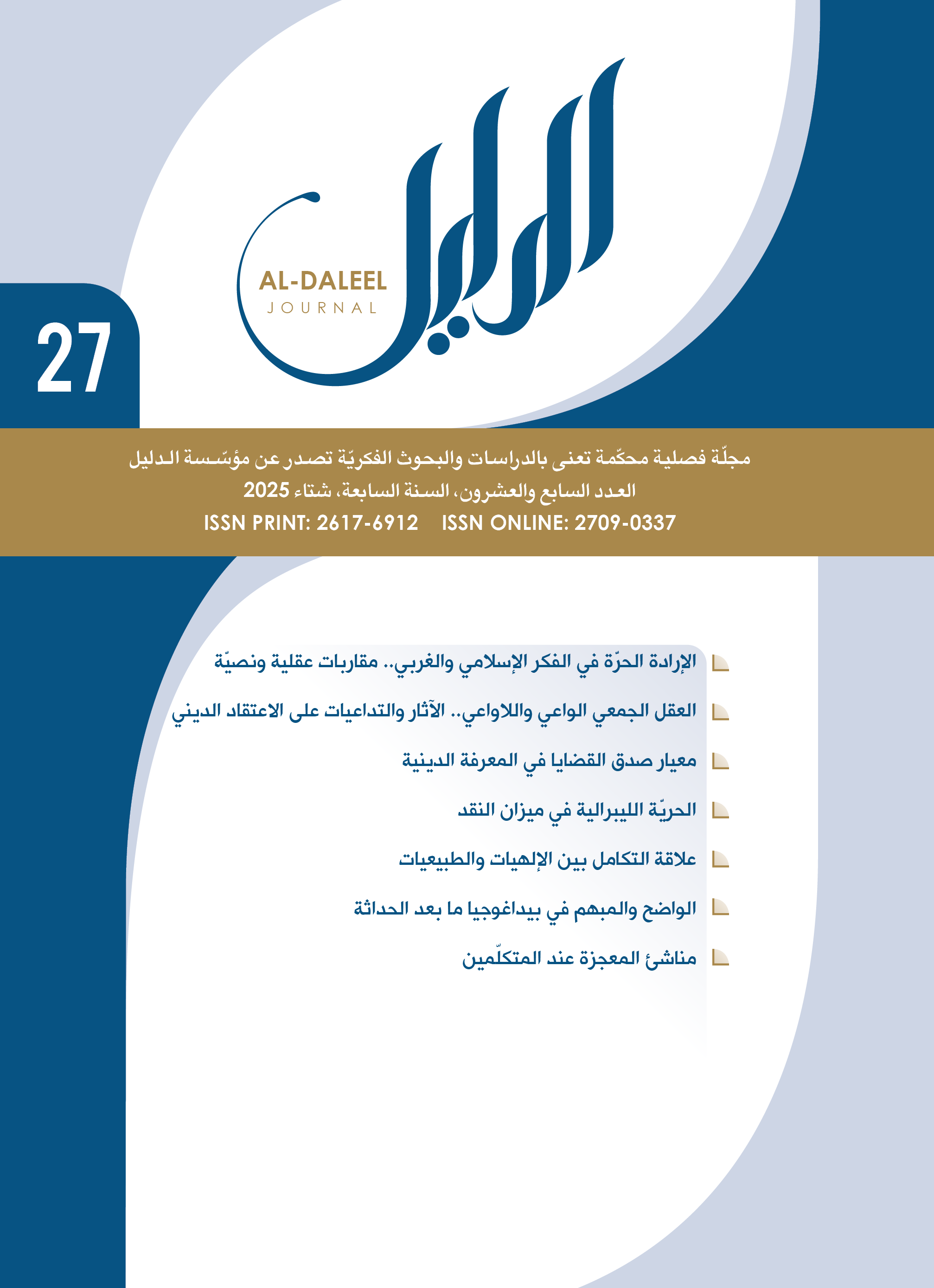Abstract
The question of human freedom and choice within the framework of divine justice is a prominent intellectual debate that has occupied human thought. It raises a central question regarding the balance between human freedom of choice and God\'s justice in predestination (Qadar) and decree (Qada\'). If humans are entirely free in their actions, how can God be all-knowing and the administrator of the universe? Conversely, if humans are compelled to act by the will of God, how can divine judgment be just if man lacks genuine freedom in his decisions? Islamic thought has grappled with this issue since its inception, seeking to understand the relationship between determinism (Jabr) and free will (Ikhtiyar) in light of reason and revelation. Meanwhile, some modern and Western philosophies offer materialistic and analytical interpretations of this problem. David Hume, for example, argues that free will must be understood within the framework of natural causality, where human actions are linked to empirical causes, weakening the idea of absolute choice but not entirely negating moral responsibility. Sam Harris, on the other hand, adopts a more deterministic view, arguing that free will is merely an illusion because human decisions are governed by pre-existing biological and neurological factors, thereby limiting individual responsibility for their actions. This philosophical understanding intersects with Islamic and religious debates concerning predestination and decree. However, the fundamental difference lies in the metaphysical basis. Islamic thought relies on the duality of divine justice and moral responsibility, while modern perspectives originate from a purely materialistic standpoint. This issue remains a focal point of ongoing intellectual discussion, with numerous approaches seeking to understand it according to the data of religion, philosophy, and science. Furthermore, how can religious texts - particularly the scientific and intellectual foundations laid down by Imam al-Ridha (peace be upon him) - pertaining to predestination, decree, determinism, and free will be understood in the context of reason and the principles of divine justice? All of this will be presented within the framework of ancient and contemporary intellectual debates and approaches to address this problem.
Keywords
David Hume
Determinism and Free Will
Divine justice
Free Will
Imam al-Ridha
Rational Good and Evil
Sam Harris
Abstract
تُعدّ مسألة حرّية الإنسان واختياره في ظلّ عدالة الله تعالى من أبرز الجدليات الفكرية التي شغلت الفكر الإنساني؛ إذ تطرح تساؤلًا محوريًّا حول التوازن بين حرّية الإنسان في الاختيار وبين عدالة الله في القضاء والقدر. فإذا كان الإنسان حرًّا تمامًا في أفعاله، فكيف يكون الله عالِمًا بكلّ شيء ومدبِّرًا للكون؟ وإن كان الإنسان مجبرًا على أفعاله بمشيئة الله ، فكيف يكون الحساب الإلهي عادلًا إذا لم يكن لديه حرّية حقيقية في قراراته؟ فقد ناقش الفكر الإسلامي هذه المسألة منذ بداياته، ساعيًا إلى فهم العلاقة بين الجبر والاختيار في ضوء العقل والنقل، بينما قدّمت بعض الفلسفات الحديثة والغربية قراءاتٍ مادّيةً وتحليليةً لهذه الإشكالية. فيرى ديفيد هيوم أنّ حرّية الإرادة يجب أن تُفهم ضمن إطار السببية الطبيعية؛ إذ ترتبط أفعال الإنسان بأسباب تجريبية، ممّا يضعف فكرة الاختيار المطلق لكنّه لا ينفي المسؤولية الأخلاقية تمامًا. أمّا سام هاريس، فيتبنّى رؤيةً أكثر حتمية؛ إذ يجادل بأنّ الإرادة الحرّة مجرّد وهم؛ لأنّ القرارات البشرية تحكمها عوامل بيولوجية وعصبية مسبقة، ممّا يحدّ من مسؤولية الفرد في أفعاله. يتقاطع هذا الفهم الفلسفي مع الجدليات الإسلامية والدينية حول القضاء والقدر، إلّا أنّ الاختلاف الجوهري يكمن في الأساس الميتافيزيقي؛ فيعتمد الفكر الإسلامي على ثنائية العدل الإلهي والمسؤولية الأخلاقية، بينما تنطلق الرؤى الحديثة من منظور مادّي بحت. تبقى هذه الإشكالية محورًا للنقاش الفكري المتجدّد، فتتعدّد المقاربات التي تسعى لفهمها وفق معطيات الدين والفلسفة والعلم. وكيف يمكن فهم النصوص الدينية - لا سيّما ماورد من تأصيل علمي وفكري للإمام الرضا - المتعلّقة بالقضاء والقدر والجبر والاختيار وفي سياق معطيات العقل ومبادئ العدل الإلهي؟ وهذا كلّه سوف يُطرح ضمن جدليات ومقاربات فكرية قديمة ومعاصرة لمعالجة هذه الإشكالية.
Keywords
الإرادة الحرّة
الإمام الرضا (ع)
الجبر والاختيار
الحسن والقبح العقليين
العدل الإلهي
ديفيد هيوم
سام هاريس
